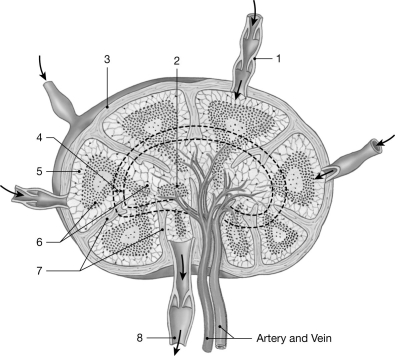Exam 19: The Lymphatic System and Immunity
Exam 1: An Introduction to Anatomy and Physiology72 Questions
Exam 2: Chemical Level of Organization141 Questions
Exam 3: Cellular Level of Organization137 Questions
Exam 4: Tissue Level of Organization121 Questions
Exam 5: The Integumentary System83 Questions
Exam 6: Osseous Tissue and Bone Structure113 Questions
Exam 7: The Skeleton205 Questions
Exam 8: Articulations89 Questions
Exam 9: Skeletal Muscle Tissue115 Questions
Exam 10: The Muscular System136 Questions
Exam 11: Neural Tissue133 Questions
Exam 12: The Spinal Cord, Spinal Nerves, and Spinal Reflexes104 Questions
Exam 13: The Brain and Cranial Nerves261 Questions
Exam 14: The Autonomic Nervous System92 Questions
Exam 15: The Special Senses148 Questions
Exam 16: The Endocrine System158 Questions
Exam 17: Blood and Blood Vessels203 Questions
Exam 18: The Heart and Cardiovascular Function185 Questions
Exam 19: The Lymphatic System and Immunity125 Questions
Exam 20: The Respiratory System147 Questions
Exam 21: The Digestive System169 Questions
Exam 22: Metabolism and Energetics74 Questions
Exam 23: The Urinary System90 Questions
Exam 24: Fluid, Electrolyte, and Acid-Base Balance53 Questions
Exam 25: The Reproductive System143 Questions
Exam 26: Development and Inheritance91 Questions
Select questions type
________ occurs when an antigen fragment-glycoprotein complex appears in a plasma membrane.
(Short Answer)
4.9/5  (42)
(42)
Lymphocytes may be found in which of the following tissues or organs?
(Multiple Choice)
4.8/5  (39)
(39)
Defense of the body against a particular pathogen is provided by
(Multiple Choice)
4.9/5  (35)
(35)
Destruction of antigens or cell lysis can be caused by all of the following except by
(Multiple Choice)
4.8/5  (40)
(40)
Leslie has a bad sore throat, and the lymph glands in her neck are swollen. This would indicate that
(Multiple Choice)
4.8/5  (39)
(39)
 Figure 19-1 The Structure of a Lymph Node
Use Figure 19-1 to answer the following questions:
-Identify the dominant cell type in the area labeled "6."
Figure 19-1 The Structure of a Lymph Node
Use Figure 19-1 to answer the following questions:
-Identify the dominant cell type in the area labeled "6."
(Multiple Choice)
4.9/5  (35)
(35)
When an antigen is bound to a Class I MHC molecule, it can stimulate a ________ cell.
(Multiple Choice)
4.9/5  (33)
(33)
________ is another name for an antibody found in body fluids.
(Short Answer)
4.9/5  (31)
(31)
Immunity that results from antibodies that pass the placenta from mother to fetus is called ________ immunity.
(Multiple Choice)
4.8/5  (41)
(41)
The process by which antibodies bind to antigenic sites on viruses or toxins, rendering them incapable of binding to other cells, is called ________.
(Short Answer)
4.9/5  (40)
(40)
You are a researcher interested in studying the cytoskeleton. How can you use antibodies to locate actin- and tubulin-containing structures?
(Essay)
4.7/5  (36)
(36)
The various classes of immunoglobulins are differentiated on the basis of their
(Multiple Choice)
5.0/5  (34)
(34)
________ are clusters of lymphoid nodules deep to the epithelial lining of the small intestine.
(Multiple Choice)
4.8/5  (32)
(32)
The largest single collection of lymphoid tissue in the adult body is located in the
(Multiple Choice)
4.9/5  (39)
(39)
The process by which antigens combine with antibodies to form immune complexes is called ________.
(Short Answer)
4.8/5  (42)
(42)
Showing 101 - 120 of 125
Filters
- Essay(0)
- Multiple Choice(0)
- Short Answer(0)
- True False(0)
- Matching(0)